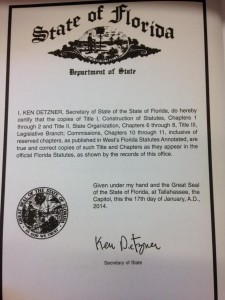Copyright Issues with State Codes
 Hello, Gentle Reader! Long time no post! I’m in the process of writing up my research results from my survey/census of state published legal information. You can get a preview of my findings in my recent Slaw.ca column “What Do You Mean the Law is Closed?” or this slide show that illustrates that post with some of the data included. I didn’t make that slide show explicitly to go with the post – I’ve been traveling and I presented on my research using that deck.
Hello, Gentle Reader! Long time no post! I’m in the process of writing up my research results from my survey/census of state published legal information. You can get a preview of my findings in my recent Slaw.ca column “What Do You Mean the Law is Closed?” or this slide show that illustrates that post with some of the data included. I didn’t make that slide show explicitly to go with the post – I’ve been traveling and I presented on my research using that deck.
One of the topics that I’m covering in my coming research report is the copyright…well, confusion, frankly….that exists with state codes. There are so many copyright notices on state legal information webpages! It’s not entirely clear if they mean the legal info content or if it’s just something always stuck in the boiler plate of the webpage and they don’t really mean it or something in between. Although I’m generally trying to stick to web-based publishing of law, I thought that before I left the HLS Mothership for the holidays, I’d check out their print collection of codes and see what the situation was there in hopes that would clear some things up.
SPOILER ALERT. IT DID NOT CLEAR THINGS UP FOR ME.
It did, however, find provide some fascinating data points. For various definitions of the word ‘fascinating.’
For “official” print codes, I found the following numbers:
- 4 – No Claim of Copyright by anyone
- 22 – State Claims Copyright
- 10 – Thomson Reuters (or some subsidiary thereof) Claims Copyright
- 9 – LexisNexis (or some subsidiary there of, usually Mathew Bender) Claims Copyright
- 3 Shared Claim of Copyright between State and Publisher
Sharp eyed readers will note that this only adds up to 48 codes. That’s because some states have designated their online code to be official and some states have two official codes.
BUT HERE’S WHAT I FOUND TO BE REALLY INTERESTING….
Most of the codes are annotated, so it’s entirely possible that the claim of copyright is referring to the annotations. Whether or not that is kosher is currently being decided in State of Georgia v. Malamud. BUT BUT BUT… Seven codes – Connecticut, Idaho, Minnesota, Nebraska, Nevada, South Carolina, South Dakota, and Washington – are UN-annotated and yet there still is a state claim of copyright slapped on them. So, unless I’m making a crazy assumption here, that means that these states are claiming copyright on something that is a clear edict of government (and thus public domain.)
Harvard has more than just the official codes in their collection, so in for a penny, in for a pound and I went through 64 state codes in total. The numbers for them ended up being:
- 4 No Claim of Copyright by Anyone
- 23 State Claims Copyright
- 21 Thomson Reuters (or some subsidiary thereof) Claims Copyright
- 13 LexisNexis (or some subsidiary thereof) Claims Copyright
- 3 Shared Claim of Copyright between State and Commercial Publisher.
Like I said, it’s confusing to know exactly what these copyright notifications are claiming copyright on. Annotations, Section Headings, the text of the law itself… ¯\_(ツ)_/¯ However, in 3 of these codes, there was a disclaimer from the publisher (Matthew Bender each time) that they were not claiming copyright in the statutes, case quotes, etc., just the annotations. So that I was nice. And in one of the codes, the publisher (Thomson Reuters) said that they were only claiming copyright in the annotations and that the state had copyright in statutes. So, score one for being clear, I guess…
And finally, in “things I didn’t realize I had to be annoyed about”, I found that Thomson Reuters (or some subsidiary thereof) fairly often had a trademark on names such as “Iowa Code Annotated.” So if, for example, I wanted to publish my own annotated copy of the Iowa Code, I guess I would run into trademark issues with finding a clear name for it? I’m honestly not an IP expert, so I need to think and research more about that, but on first pass/gut instinct, I thought there were some rules about trademarking common-ish names.